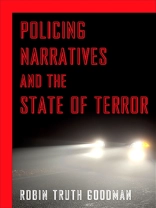Since the terrorist attacks of September 11, 2001, world politics have increasingly mirrored plots of detective novels, with high-profile criminal investigations that cross multiple borders and the internationalized law enforcement practices associated with the ‘War on Terror.’ Policing Narratives and the State of Terror examines the relationship between domestic policing and international policy through an analysis of contemporary popular detective fiction, police procedurals, police autobiography, security reports, and chronicles of domestic spying. Robin Truth Goodman connects these accounts of policing to the changing shape of the contemporary nation-state, marked by the denationalization of labor; commercial and criminal laws that jump borders more quickly than civil law protections; and the replacement of legal precedent by unrepeatable, exceptional executive decisions. Working at the intersection of literature, international law, and globalized commerce, Goodman astutely pinpoints how policing has become an increasingly troublesome instrument of empire, particularly in terms of national sovereignty and the growing numbers of mercenary private security forces.
Зміст
Acknowledgments
Introduction
1. They Came Back to Baghdad
2.From the Feminist Detective to the Security State Hero: Division of Labor and the State of Exception
3. Terrorist Hunter: Walter Mosley, the Urban Plot, and the Terror War
4. The Hunt for the World’s Greatest Outlaw
5. Military Literati: Yasmina Khadra and the Veil
Conclusion
Notes
Works Cited
Index
Про автора
Robin Truth Goodman is Associate Professor of English at Florida State University. She is the author of
World, Class, Women: Global Literature, Education, and Feminism;
Infertilities: Exploring Fictions of Barren Bodies; and (with Kenneth J. Saltman)
Strange Love: Or How We Learn to Stop Worrying and Love the Market.












